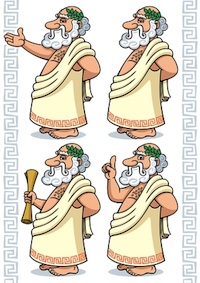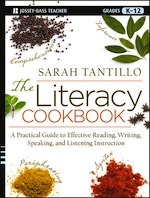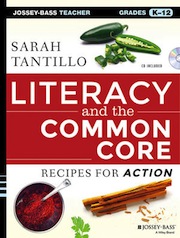Socratic Seminars in the Middle
This how-to article about Socratic Seminaring is adapted from a chapter in Sarah Tantillo’s 2012 book The Literacy Cookbook: A Practical Guide to Effective Reading, Writing, Speaking, and Listening Instruction(Jossey-Bass). Sarah has generously given our readers free access to the Socratic Seminar materials at her site via the links below. And don’t miss Sarah’s suggestion for tweaking this strategy in a June 2015 MiddleWeb post.

One terrific method for preparing students to conduct intelligent conversations is by staging Socratic Seminars. Students learn how to use effective habits of discussion, explain their ideas, and support them with evidence (Take that, Common Core Standards!).
Different educators have different ways of conducting Socratic Seminars. Here is my favorite recipe, and please note that I have made all of the resource documents mentioned here available for free at The Literacy Cookbook website’s “Socratic Seminars” page:

See the TLC “Socratic Seminars” page for the following documents: Socratic Seminar Questions on Persuasive Texts and Socratic Seminar Questions on Short Stories. Also, consider adapting questions from the Book Talk Project for Class Novel; each group can discuss a different chapter.
2. The observers. At the same time, select four other students in the outside circle to observe the four participants; the observers will complete a checklist and give feedback on their designated participant’s performance. See the TLC “Socratic Seminars” page for the Socratic Seminar Observation Checklist.
3. The notetakers. Everyone else in the class takes guided notes on the discussion. (NOTE: Sample questions for guided notes are included in the question files, Socratic Seminar Questions on Persuasive Texts and Socratic Seminar Questions on Short Stories.) Use a detailed rubric to score each of the discussants. See the TLC “Socratic Seminars” page for the Socratic Seminar Rubric.
4. After the discussion. Invite the observers to share a few positive comments, then provide your own specific constructive feedback so that everyone in the room will learn more about how to do well.
5. Lather, rinse, repeat. Rotate the participants. Although you probably won’t have time in one class period for every student to experience every different role, assure them that eventually they will all have numerous chances to be a discussant in the middle, be an observer, and take notes. NOTE: Plan ahead! Having a well-organized grade-recording system will make your life easier.
Tips for Introducing Socratic Seminars

► Don’t rush into the discussions without establishing your expectations for each role. Explain the logistics fully and patiently. Take as much time as you need to clarify terms on the rubric, observation checklist, and guided notes organizer. Describe what a solid performance looks (and, of course, sounds) like, and be sure to emphasize that this is a group DISCUSSION, not just four people delivering monologues. How they respond to one another will affect their grade. Remind them to use effective vocabulary and academic language (or “accountable talk” or “habits of discussion,” or whatever you call it), and point to any helpful posters for reference. Also, stress the importance of proper volume.
► Customize the discussion questions and guided notes organizers as needed, but the rubric and observation checklist can stay the same. It is generally best if different rounds of students do not discuss exactly the same material (because the discussions can become repetitious and boring), but if they must, they should address it from different angles. For example, if you want five groups to discuss a novel or memoir, give each group a different chapter or set of questions to tackle.
► Make sure note-takers understand what good notes look like. Few of us emerge from the womb knowing how to take notes. Show them models. Teach them shortcuts and common abbreviations.
► The observers’ job is to provide positive feedback. At least initially, it’s best to limit observers’ comments in the post-Seminar debrief discussion to “what the person I observed did WELL.” After each participant has received some positive strokes, you can offer “things to work on for next time.” Later on, after you’ve trained students in effective CONSTRUCTIVE feedback, then you can encourage a more “critical friend” form of response.

1) What are your high school and college plans?
2) What do you think your biggest challenges will be?
3) How do you expect to deal with these challenges?
Once they’ve gained their footing, you can shift their attention to more academic topics and texts. The bottom line is this: If you can make everyone as comfortable as possible when launching this challenging task, it could become an invaluable tool in your classroom. Indeed, in one class where I coached the co-teachers, their students began to REQUEST Socratic Seminars as a way to process what they were learning.
► Keep in mind that in order to conduct effective discussions about texts, students must read and analyze texts effectively. Check out the TLC “Analyzing Literature” page for more information on how to teach students how to annotate and analyze texts (the info on this page requires a TLC membership). And keep in mind that the skills developed through seminaring in this way dovetail neatly into the higher expectations set by Common Core standards.
For another MiddleWeb post about
Socratic Seminars (and UDL strategies), see:
Rewiring Student Brains for Class Discussions
The resources
Here again are the key documents you’ll need in order to run Socratic Seminars. They can be downloaded for free – see the links at the bottom of the TLC “Socratic Seminars” page:
▪ Socratic Seminar Observation Checklist
▪ Socratic Seminar Questions on Persuasive Texts
▪ Socratic Seminar Questions on Short Stories
▪ Socratic Seminar Rubric
▪ Book Talk Project for Class Novel
▪ Habits of Discussion 1-pager
Also see: Tweaking a Socratic Seminar Strategy for the Middle Grades



































Thank you for sharing!
I created a GoogleForm based on your Socratic Seminar Observation Checklist and would like to share this with #5thchat on Twitter. Giving you credit of course! Please advise and thanks for all the helpful information.
@Colleen– Glad you’re finding this useful, and you are welcome to share it. You might also want to point people to the The Literacy Cookbook Website (www.literacycookbook.com) and TLC Blog (http://theliteracycookbook.wordpress.com) for more good stuff! Cheers, SarahT.